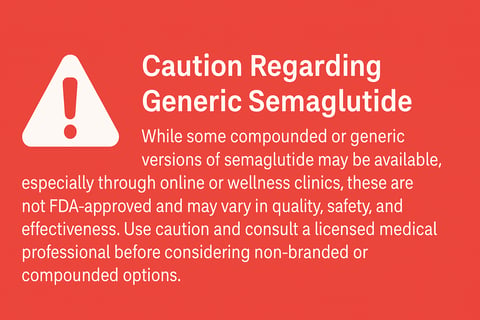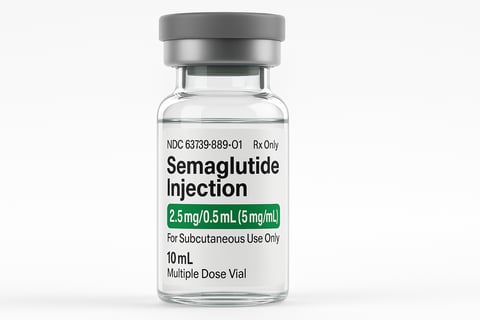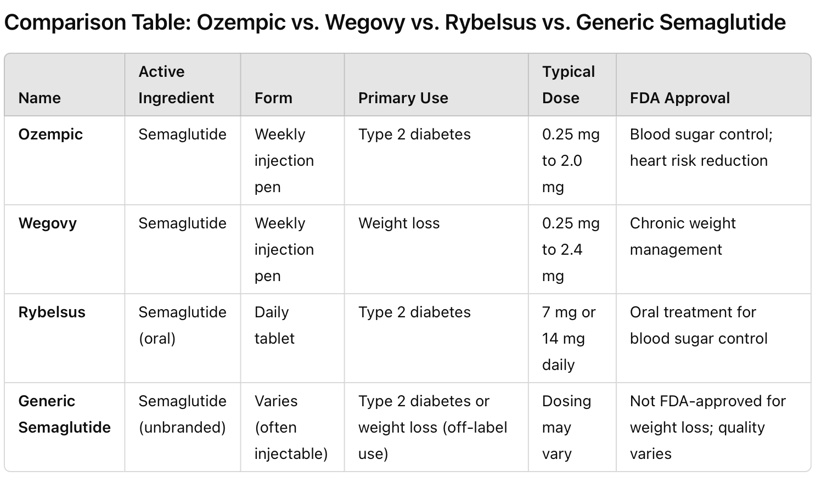



Wondering what all the hype is about Ozempic, Wegovy and semaglutide?
These medications are changing the game for weight loss and type 2 diabetes — but they’re not all the same. Whether you're considering a prescription or just curious, this guide breaks down how they work, their key differences, and what results to expect.
Semaglutide, Ozempic, and Wegovy
The Ultimate Guide to These Powerful Medications


What Is Ozempic? (And How It Relates to Semaglutide and Wegovy)
If you've been hearing a lot about Ozempic, Wegovy, Rybelsus or Semaglutide you're not alone. These medications have made headlines for their impressive ability to lower blood sugar and support significant weight loss — even in people who’ve struggled for years. What do they all have in common? They’re powered by a breakthrough compound called semaglutide.
Semaglutide is the generic name for the medication used in popular brands like Ozempic, Wegovy, and Rybelsus.
Originally developed for managing type 2 diabetes, semaglutide has quickly become one of the most talked-about treatments for obesity and metabolic health. But what exactly is it? How does it work? And is it really the game-changer people claim it to be?
In this guide, we’ll break down everything you need to know about semaglutide, Ozempic, Wegovy, and Rybelsus — from how they work in your body, to how they’re taken, how effective they are, and what to expect in terms of results and side effects.
Whether you're considering one of these medications or just curious about the hype, this article will give you the clarity you need to make an informed decision.
How Does Semaglutide Work in the Body?
Semaglutide works by imitating the GLP-1 hormone, which is released by the gut in response to food. It acts on multiple systems in the body:
1. Effects on Blood Sugar Regulation
Stimulates the release of insulin (only when blood sugar is high)
Suppresses glucagon, a hormone that raises blood sugar
2. Appetite Control and Slower Digestion
Slows gastric emptying, which means food stays in your stomach longer
Helps you feel fuller, reducing the urge to eat
3. Impact on Brain and Satiety Signals
Acts on hunger centers in the brain to decrease appetite
Reduces cravings and makes it easier to stick to a reduced-calorie diet
This triple-action effect helps improve blood sugar levels and encourages meaningful, sustainable weight loss over time.
Ozempic vs Wegovy vs Rybelsus: What’s the Difference?
Although Ozempic and Wegovy are often used interchangeably in everyday conversation, they’re not exactly the same — even though they share the same active ingredient: semaglutide. Understanding the difference between Ozempic, Wegovy, and semaglutide is key to knowing which option might be best for you.
Ozempic is approved to treat type 2 diabetes and reduce the risk of major cardiovascular events. It also promotes weight loss but is not FDA-approved for that purpose alone.
Wegovy is FDA-approved specifically for chronic weight management in individuals with obesity or overweight with related health conditions.
Rybelsus, another version of semaglutide, comes in oral tablet form and is approved for type 2 diabetes — not weight loss.
The key differences lie in dosage, intended use, and how they're taken. While they all contain semaglutide, the choice between them depends on your health goals — whether you're managing blood sugar, trying to lose weight, or both.


Key Differences:
Ozempic and Wegovy are injections, while Rybelsus is the only oral form.
Wegovy uses higher doses and is approved specifically for weight loss.
All versions use the same active ingredient but are tailored to different patient needs.
How to Take Semaglutide: Ozempic, Wegovy, and Rybelsus
Injections (Ozempic & Wegovy):
Once a week, using a pre-filled injection pen
Self-administered subcutaneously in the abdomen, thigh, or upper arm
Each pen contains multiple doses, with a dial to adjust as you titrate up
Oral Tablet (Rybelsus):
Taken once daily, 30 minutes before any food, drink, or other meds
Must be swallowed whole with just a sip of water (not chewed or split)
Has more strict timing rules than the injectable versions
Despite some people’s hesitation about injections, the process is generally painless and designed to be convenient and discreet.
How Effective Is Semaglutide?
Benefits for Type 2 Diabetes Management:
A1C reduction of up to 2% in many patients
Helps reduce risk of cardiovascular events in patients with heart disease
Aids in weight loss, which improves insulin sensitivity and metabolic health
Clinical Results for Weight Loss with Wegovy:
Clinical trials show impressive results for Wegovy:
Average weight loss: 15% of starting body weight
Some individuals lost 20% or more
Participants also experienced improvements in blood pressure, cholesterol, and inflammation
Semaglutide vs Other Weight Loss Medications
Compared to other weight loss drugs, semaglutide is among the most effective currently available.
Do You Still Need to Diet and Exercise While Taking Semaglutide?
Yes — absolutely. While semaglutide (whether you're taking Ozempic, Wegovy, or Rybelsus) can significantly reduce appetite and support weight loss, it's not a magic solution on its own. To get the best results — and maintain them — diet and exercise still play a vital role.
Why Lifestyle Still Matters
Diet creates the calorie deficit needed for fat loss. Semaglutide may help you feel full sooner and reduce cravings, but it's your food choices that determine how much fat your body burns.
Exercise improves insulin sensitivity, builds lean muscle, and boosts metabolism. It also helps prevent the weight regain that often happens when medications are stopped.
Healthy habits lead to long-term success. The medication may jump-start your progress, but it’s your behavior — consistent movement, mindful eating, sleep, stress management — that sustains it over time.
How to Maximize Results with Diet and Physical Activity
People who used semaglutide alongside structured lifestyle changes — including nutrition support, physical activity, and behavioral coaching — lost significantly more weight than those who relied on the medication alone.
Think of semaglutide as a powerful catalyst — not a replacement.
It gives you the momentum, but long-term transformation comes from building habits that support your health even after the medication ends.
Who Should Use Semaglutide?
Semaglutide-based medications like Ozempic, Wegovy, and Rybelsus can be highly effective, but they’re not for everyone. Whether you're looking to manage diabetes, lose weight, or both, it's important to know if you're a good fit.
✅ Eligibility for Ozempic, Wegovy, and Rybelsus:
Have type 2 diabetes and need better blood sugar control
Have a BMI of 30 or higher (classified as obesity)
Have a BMI of 27 or higher and also suffer from a weight-related condition, such as:
High blood pressure
High cholesterol
Sleep apnea
Insulin resistance or prediabetes
Have struggled to lose weight through diet and exercise alone
In these cases, semaglutide may offer the boost you need to improve your health and reduce long-term risks.
⚠️ Who Should Avoid Semaglutide?:
Have a personal or family history of medullary thyroid cancer
Have Multiple Endocrine Neoplasia syndrome type 2 (MEN2) — a rare genetic endocrine disorder
Have type 1 diabetes, as semaglutide is not designed for insulin-dependent diabetes
Have a history of severe gastrointestinal disorders, such as gastroparesis
Always consult a healthcare provider before starting treatment — a thorough review of your medical history and goals is essential for safe and effective use
Possible Side Effects
While many people tolerate semaglutide well, some experience side effects — especially early in treatment or when increasing the dose.
Common Side Effects:
Nausea (most common)
Diarrhea
Constipation
Vomiting
Stomach pain
Headache
Fatigue
Decreased appetite
Serious (but rare) Side Effects:
Pancreatitis
Gallbladder disease
Kidney injury (usually related to dehydration)
Low blood sugar (mainly when combined with insulin or sulfonylureas)
Thyroid C-cell tumors (observed in animals — not yet confirmed in humans)
To minimize side effects:
Start with a low dose and titrate slowly
Eat smaller, blander meals
Stay hydrated, especially if experiencing nausea
How Long Do You Need to Take Semaglutide?
Semaglutide is typically prescribed as a long-term treatment, especially for chronic conditions like obesity and type 2 diabetes.
If stopped, many people regain the lost weight within months — unless they've also made lasting changes to their diet, activity levels, and lifestyle. For this reason, ongoing support is key.
Final Thoughts: Is Semaglutide Right for You?
Semaglutide (under the names Ozempic, Wegovy, and Rybelsus) has revolutionized the way we treat both type 2 diabetes and obesity. Its ability to regulate blood sugar, curb appetite, and support real weight loss makes it a powerful option — but not a miracle pill.
Pair it with smart lifestyle choices, and you’ll have a powerful formula for better health.
References
U.S. Food & Drug Administration (FDA).
Ozempic (semaglutide) Prescribing Information. Revised March 2022.U.S. Food & Drug Administration (FDA).
Wegovy (semaglutide) Prescribing Information. Approved June 2021.Wilding, J.P.H., et al. (2021). Once-Weekly Semaglutide in Adults with Overweight or Obesity.
New England Journal of Medicine, 384(11), 989–1002.American Diabetes Association.
Pharmacologic Approaches to Glycemic Treatment: Standards of Medical Care in Diabetes—2023. Diabetes Care, 46(Supplement_1): S140–S157.Davies, M.J., et al. (2017). Semaglutide for the treatment of type 2 diabetes.
The Lancet Diabetes & Endocrinology, 5(5), 377–386.Novo Nordisk (manufacturer of Ozempic, Wegovy, and Rybelsus).
Official Product Website – Wegovy
Official Product Website – Ozempic
Official Product Website – RybelsusCenters for Disease Control and Prevention (CDC).
Defining Adult Overweight & Obesity. Updated May 2022.Garvey, W.T., et al. (2022). Clinical Guidelines for the Management of Obesity Using Semaglutide.
Obesity (Silver Spring), 30(S2), S1–S14.
